Vitamin E is commonly used in skin care, helping to moisturize, reduce dark spots, slow down the aging process… However, does applying vitamin E to the face cause sunburn? What should be noted when using vitamin E for skin care?
1. What are the effects of applying vitamin E to the face?
Topical vitamin E can have the following effects:
- Vitamin E is an antioxidant that can help soothe inflammation, prevent the harmful effects of free radicals, and improve moderate dark spots.
- Slows down the formation of wrinkles, prevents skin aging.
- Moisturizes and strengthens the skin’s protective barrier. Also thanks to its moisturizing properties, vitamin E can help reduce symptoms of itching and discomfort caused by allergies or other causes of itchy skin.
- Combining vitamin E and vitamin C can even out skin tone.
- Accelerates the healing process (however, there is still little research on this form).

Vitamin E can provide many benefits for the skin.
In addition, when using topical vitamin E, many people worry about whether vitamin E causes sunburn or not.
Vitamin E protects the skin from harmful agents from sunlight. The antioxidants in vitamin E can help neutralize the effects of free radicals caused by ultraviolet radiation.
Not only that, thanks to its moisturizing effect, vitamin E helps soothe dry, burning skin and promotes the recovery process after sunburn. However, this does not mean that vitamin E can completely protect the skin from sunlight. You need to use sunscreen and mechanical sunscreen methods to protect the skin.
2. What should you keep in mind when applying vitamin E to the face?
Although vitamin E brings many positive benefits to the skin, this ingredient can clog pores and cause acne, especially when used incorrectly. For this reason, people with acne-prone skin or clogged pores should not apply vitamin E to their skin.
When applying vitamin E to the face, it is important to note:
- Before applying vitamin E to the face, test the skin’s reaction on a small area of skin. This helps limit the risk of irritation and skin damage. If the skin does not have any special reactions, you can apply vitamin E to the face.
- When you first start using it, apply a thin layer. Use a low concentration of vitamin E and apply a thin layer on the skin in the first few days. After that, you can gradually increase the amount or concentration when the skin is used to the nutrients.
- Prioritize using it for evening skin care. Vitamin E is thick, so it should be applied before bed so that the active ingredient can be fully absorbed. Using vitamin E during the day can make you feel uncomfortable and heavy on the face
- When using pure vitamin E oil, mix it with a base oil (you can use jojoba oil, almond oil or coconut oil).
- Use vitamin E 1-2 times a week or every other day to avoid clogging pores.
- When using vitamin E to treat melasma (pigmentation), consult your doctor. Usually, vitamin E is often used in combination with vitamin C to increase the effectiveness of improving this condition.
- Always apply sunscreen when going out to protect your skin from the harmful effects of sunlight.





